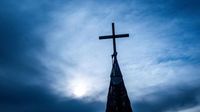As the long Easter weekend approaches, many in Germany are preparing to spend time with family and friends, but they must also navigate a complex web of regulations associated with Good Friday, a 'silent holiday.' On April 18, 2025, strict rules will govern activities across the country, particularly in regions like Rhineland-Palatinate, Hesse, and Baden-Württemberg.
Good Friday is not just any holiday; it is a day steeped in solemnity and religious significance for many Christians. In accordance with local laws, this day prohibits loud activities such as mowing lawns, hammering, or drilling—similar to restrictions in place on other public holidays and Sundays. Public gatherings, parades, or processions are also forbidden unless they serve a religious purpose. This is especially true in areas like Gießen, Marburg, and Wetzlar, where the Hessian Ministry for Internal Affairs has emphasized the importance of maintaining the day’s reverent atmosphere.
In addition to prohibiting public gatherings, commercial sporting events are also banned on Good Friday. For instance, Eintracht Frankfurt's scheduled Europa League match against Tottenham will take place on April 17, 2025, to avoid conflicts with the regulations. The dance ban, which applies from Maundy Thursday at 4:00 AM until Easter Sunday at 4:00 PM, is another notable restriction. This means that dance events are off-limits during this period, as outlined in Rhineland-Palatinate's state law.
Local authorities can grant exceptions for significant reasons, but these are rare. The silent days, which include Good Friday, All Saints' Day, the Day of National Mourning, and Christmas Eve from 1:00 PM, are designed to encourage reflection and remembrance of Jesus Christ's suffering and sacrifice.
In Mecklenburg-Vorpommern, public dance events and the operation of gambling halls and betting shops are similarly prohibited from Good Friday at midnight until Holy Saturday at 6:00 PM. Violating these regulations can result in fines of up to 5,000 euros. Interestingly, since 2019, no violations of the dance ban have been reported in Rostock, indicating a high level of compliance among venue operators.
However, these restrictions are not without controversy. Critics argue that such regulations infringe on personal freedoms and the entrepreneurial spirit. Thomas Filimonova, owner of the LKA Longhorn club in Baden-Württemberg, has vocally opposed the dance ban, stating, "I don’t want the church telling me when I can dance." His club hosts an event every year on Good Friday with a special permit, but without this evening, he estimates a loss of around 7,000 euros.
In contrast, supporters of the dance ban argue that Good Friday serves as a vital reminder of the suffering and sacrifice associated with the Christian faith. Dr. Jörg Schneider from the Protestant Church in Baden-Württemberg noted, "The focus should be on others and the world, away from our own needs." This sentiment reflects a broader cultural perspective that values the solemnity of the day.
In the realm of cinema, restrictions also apply on Good Friday. Only films that maintain a 'serious character' appropriate for the day may be shown. In 2024, only three films were denied holiday releases, including horror titles like "Terrifier 3" and "Sabel is Still Young." In 2025, the horror film "The Monkey" will also not be approved for screening due to its content.
Despite the declining church membership in regions like Baden-Württemberg, the dance ban remains firmly in place, demonstrating the enduring influence of tradition over changing societal norms. The debate over the appropriateness of such restrictions continues, with some calling for a reevaluation of these laws in light of modern values.
In summary, as Germans prepare for Easter, they must also navigate the intricate rules that accompany Good Friday. These regulations reflect a blend of respect for religious traditions and the ongoing tension between personal freedoms and communal values. Whether one views these laws as a necessary observance or an outdated restriction, they undeniably shape the cultural landscape of the holiday.









